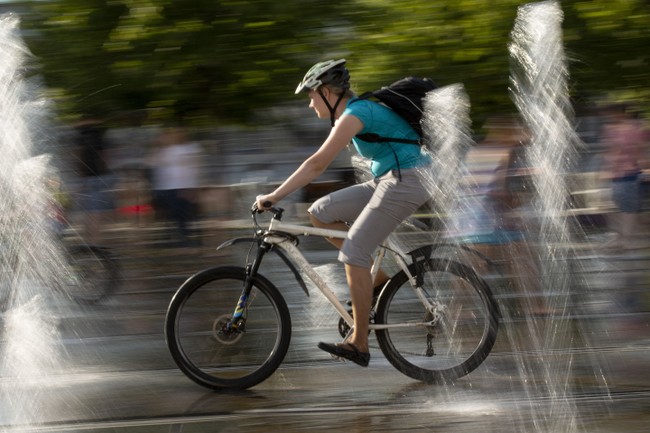
There are about to be fireworks at the Glendale, CA, City Council meeting this Tuesday night. For almost a year, Glendale residents have been battling the Progressive wing of their city council over a plan to use a projected one-half billion dollars to crisscross city streets with ninety miles of bicycle lanes. This will include nearly 50 miles of traffic lanes, parking spaces, repurposed as colorful, barricaded bike lanes known as class IV protected lanes. These lanes purposely slow traffic and restrict vehicle mobility. The plan is to repurpose streets and parking spaces as bicycle lanes, shrinking roads down to a single lane of traffic. The test case for the city’s plan is the North Brand Boulevard Complete Streets Demonstration Project, a particularly dizzying flamboyant half-mile that was quickly constructed down the middle of one of Glendale’s busiest commercial streets.
Advertisement
The goal of the North Brand Project is to demonstrate to the community how wonderful the bike lanes will be, but it has had the opposite effect, running into stiff opposition from the community. City council meetings have gone into the early hours of the morning. With over a hundred people showing up to comment, council members have received thousands of negative emails and over a thousand hand-delivered opposition letters. Even the city fire chief spoke out against the plan, arguing that it will result in slower emergency response times. This Tuesday, December 10th, the council will consider whether to spend more money to continue the project or spend more money to remove the lane.
What makes this meeting significant beyond the city of Glendale is that the North Brand Blvd. bike lane demonstration project is just the beginning of a broader plan. This plan will force every city in California to retrofit their streets with bicycle lanes under the guise of “road improvements.” The California “complete streets” bill, SB 960, written by State Senator Scott Wiener (architect of all chaos and destruction) and co-authored by Assemblywoman and Congresswoman-elect Laura Friedman, requires the state highway operation and protection program (SHOPP) to “adopt targets and performance measures reflecting state transportation goals and objectives” by 2027. The state will begin mandating that cities redesign their streets in compliance with the utopian dream of turning California into Amsterdam. SB 960 states:
Advertisement
This bill would require the targets and performance measures adopted by the commission to include targets and performance measures reflecting state transportation goals and objectives for complete streets assets that reflect the existence and conditions of bicycle, pedestrian, and transit priority facilities on the state highway system. The bill would require the departments plain language performance report to include a description of complete streets facilities, including pedestrian, bicycle, and transit priority facilities on each project, as specified. The bill would require the department to commit to specific 4-year targets to incorporate complete streets facilities, including pedestrian and bicycle facilities, into projects funded by the SHOPP, as specified.
In 2017, Senator Wiener wrote the Road Repair Accountability Act (SB1), which raised the state’s gas tax to provide billions of dollars for bicycling infrastructure and local transportation projects. Local road repair projects will be required to live up to “complete streets” standards, retrofitting cities across the state with sprawling bike lanes. In order to prevent residents from fighting back, Senator Wiener authored another bill exempting bike lane builds and projects that “reduce or eliminate minimum parking requirements” from review by the California Environmental Quality Act (CEQA). Apparently, environmental regulations are necessary to save the world until Democrats can’t get something they want, at which point the regulations become “wasteful” and “marred in bureaucratic processes.” This was an important step in fast-tracking projects like Glendale’s North Brand Blvd bike lane “quick build” across the state.
Advertisement
The reason Glendale, a city known for its love of cars, is being used as an unlikely pilot city is that Laura Friedman ( a former Glendale mayor) brought in $60 million of this gas tax money to Glendale to reimagine its roads. According to the League of Bicyclists, only 1.1 percent of Los Angelenos commute by bike, but, as Friedman has openly stated, this is part of Sacramento’s plan to force people to stop driving cars. The Glendale city council is currently split, with the three Democrat members supporting the full bike lane project and the two Republican members opposed. Tuesday night will serve as a test of whether Democrats have learned anything from this last election about the dangers of pushing people too hard with unpopular agendas. The way the vote in Glendale goes may determine the direction taken by other California cities. Wherever you live, tune in to the Council meeting this Tuesday at 6 pm.
